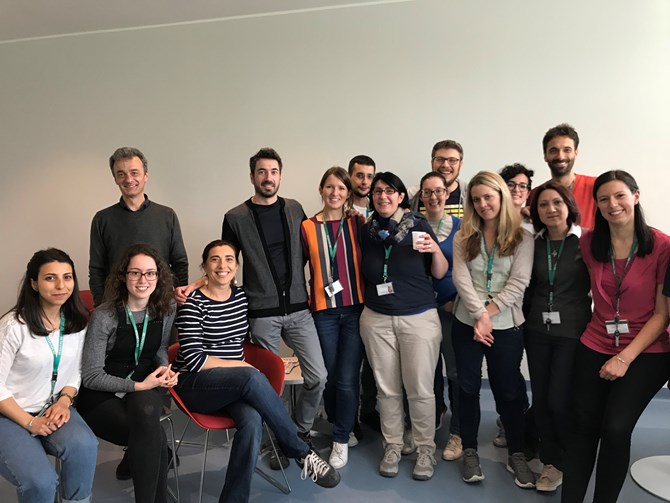Transcriptional Control in Inflammation and Cancer

Gioacchino Natoli
Group Leader
| [email protected] | |
| Location |
Building 13
Floor 3rd Via Adamello 16, Milano |

The human genome contains more than 20.000 genes whose expression must be accurately controlled in space and time, both during development and in response to external stimuli such as microbes or changes in micro-environmental conditions (e.g. hypoxia). Each cell in a tissue integrates and interprets information coming from a continuously changing micro-environment in order to properly adapt its properties and maximize its fitness. Moreover, responses to microbes or tissue damage, which are essential to restore homeostasis and eventually for organism survival, require rapid changes in gene expression whose control must be accurately tuned. Non-physiological alterations in gene expression determine abnormal cell behaviors in many diseases, including inflammatory disorders and cancer. In fact, some commonly used drugs, such as glucocorticoids, and many others currently under development, work by directly changing gene transcription or by altering chromatin properties.
Our lab uses a combination of genomic, computational and functional approaches to tackle fundamental questions in three main research domains:
- How gene expression in response to different inflammatory stimuli is accurately controlled. Inflammation is a central, evolutionarily conserved organismal response that aims to restore integrity of tissues damaged by microbial and non-microbial agents (such as chemicals and repeated mechanical trauma). However, if persistent and uncontrolled it becomes itself a source of damage and promotes cancer development. Hence, inflammatory responses, that are driven by rapid changes in gene expression, must be accurately controlled. Our lab has provided many contributions in this area, clarifying the molecular basis of macrophage-specific responses to damage and of how exposure to damaging stimuli generates a molecular “memory” of previous exposure.
- How cellular heterogeneity is generated in pancreatic cancer. Pancreatic ductal adenocarcinoma is the most lethal among common solid tumors and most patients survive less than one year from diagnosis. Several data indicate that a major source of this highly aggressive behavior is the massive cellular heterogeneity of this cancer, which mainly arises not from clonal variation but instead from dynamic adaptive responses occurring in tumor cells exposed to variable microenvironmental cues. In this area we employ in vitro and ex vivo approaches to identify heterogeneous and dynamic populations of cancer cells and determine the molecular bases of their diversity.
- How transcription, which is a major mutagenic force, is restricted to genes. More than ten years ago we reported that genomic regulatory elements (and in particular enhancers) can pervasively initiate extragenic transcription that however is kept under strict control. We have identified dedicated machineries that work to restrain such extragenic transcription and critically contribute to maintain genome integrity.
Most Relevant Publications
-
Cortesi A, Gandolfi F, Arco F, Di Chiaro P, Valli E, Polletti S, Noberini R, Gualdrini F, Attanasio S, Citron F, Ho IL, Shah R, Yen EY, Spinella MC, Ronzoni S, Rodighiero S, Mitro N, Bonaldi T, Ghisletti S, Monticelli S, Viale A, Diaferia GR, Natoli G
Activation of endogenous retroviruses and induction of viral mimicry by MEK1/2 inhibition in pancreatic cancer.
Sci Adv, 2024
-
Russo M, Gualdrini F, Vallelonga V, Prosperini E, Noberini R, Pedretti S, Borriero C, Di Chiaro P, Polletti S, Imperato G, Marenda M, Ghirardi C, Bedin F, Cuomo A, Rodighiero S, Bonaldi T, Mitro N, Ghisletti S, Natoli G
Acetyl-CoA production by Mediator-bound 2-ketoacid dehydrogenases boosts de novo histone acetylation and is regulated by nitric oxide
Mol Cell., 2024
-
Di Chiaro P, Nacci L, Arco F, Brandini S, Polletti S, Palamidessi A, Donati B, Soriani C, Gualdrini F, Frigè G, Mazzarella L, Ciarrocchi A, Zerbi A, Spaggiari P, Scita G, Rodighiero S, Barozzi I, Diaferia GR, Natoli G
Mapping functional to morphological variation reveals the basis of regional extracellular matrix subversion and nerve invasion in pancreatic cancer.
Cancer Cell, 2024
-
Russo M, Piccolo V, Polizzese D, Prosperini E, Borriero C, Polletti S, Bedin F, Marenda M, Michieletto D, Mandana GM, Rodighiero S, Cuomo A, Natoli G
Restrictor synergizes with Symplekin and PNUTS to terminate extragenic transcription.
Genes Dev, 2023